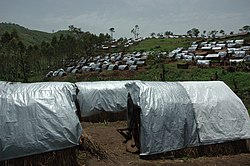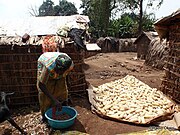The Armed Forces of the Democratic Republic of the Congo is the state organisation responsible for defending the Democratic Republic of the Congo. The FARDC was rebuilt patchily as part of the peace process which followed the end of the Second Congo War in July 2003.

North Kivu is a province bordering Lake Kivu in the eastern Democratic Republic of the Congo. Its capital is Goma.

The term Mai-Mai or Mayi-Mayi refers to any kind of community-based militia group active in the Democratic Republic of the Congo (DRC) that is formed to terrorise people and territory they work with other armed groups. Most were formed to resist the invasion of Rwandan forces and Rwanda-affiliated Congolese rebel groups, but some may have formed to exploit the war to their own advantage by looting, cattle rustling or banditry.

The Alliance of Democratic Forces for the Liberation of Congo-Zaire was a coalition of Rwandan, Ugandan, Burundian, and Congolese dissidents, disgruntled minority groups, and nations that toppled Mobutu Sese Seko and brought Laurent-Désiré Kabila to power in the First Congo War. Although the group was successful in overthrowing Mobutu, the alliance fell apart after Kabila did not agree to be dictated by his foreign backers, Rwanda and Uganda, which marked the beginning of the Second Congo War in 1998.

The Ituri conflict is an ongoing conflict between the agriculturalist Lendu and pastoralist Hema ethnic groups in the Ituri region of the north-eastern Democratic Republic of the Congo (DRC). While the two groups had fought since as early as 1972, the name 'Ituri conflict' refers to the period of intense violence between 1999 and 2003. Armed conflict continues to the present day.
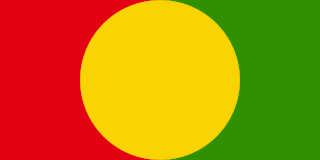
The Democratic Forces for the Liberation of Rwanda is an armed rebel group active in the eastern Democratic Republic of the Congo. It has survived by preying on the Congolese population. As an ethnic Hutu group opposed to the ethnic Tutsi influence, the FDLR is one of the last factions of Rwandan rebels active in the Congo. It was founded through an amalgamation of other groups of Rwandan refugees in September 2000, including the former Army for the Liberation of Rwanda (ALiR), under the leadership of Paul Rwarakabije. It was active during the latter phases of the Second Congo War and the subsequent insurgencies in Kivu.

The Ulindi River is a tributary of the Lualaba River in the Democratic Republic of the Congo (DRC). There is a proposal to build a hydroelectric power plant on the river to power a gold mining project.

Kalemie, formerly Albertville or Albertstad, is a town on the western shore of Lake Tanganyika in the Democratic Republic of the Congo. The town is next to the outflow of the Lukuga River from Lake Tanganyika to the Lualaba River.

The most recent Chadian Civil War began in December 18, 2005. Since its independence from France in 1960, Chad has been swamped by the civil war between the Arab-Muslims of the north and the Sub-Saharan-Christians of the south. As a result, leadership and presidency in Chad drifted back and forth between the Christian southerners and Muslim northerners. When one side was in power, the other side usually started a revolutionary war to counter it.
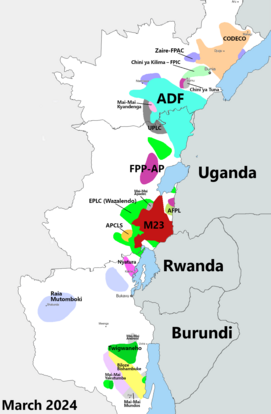
The Kivu conflict began in 2004 in the eastern Congo as an armed conflict between the military of the Democratic Republic of the Congo (FARDC) and the Hutu Power group Democratic Forces for the Liberation of Rwanda (FDLR) in the Democratic Republic of the Congo. It has broadly consisted of three phases, the third of which is an ongoing conflict. Prior to March 2009, the main combatant group against the FARDC was the National Congress for the Defence of the People (CNDP). Following the cessation of hostilities between these two forces, rebel Tutsi forces, formerly under the command of Laurent Nkunda, became the dominant opposition to the government forces.

The 2008 Nord-Kivu campaign was an armed conflict in the eastern Nord-Kivu province of the Democratic Republic of the Congo. The upsurge of violence in the Kivu conflict saw heavy battles between the Democratic Republic of Congo's army, supported by the United Nations, and Tutsi militia under General Laurent Nkunda.
The Dongo conflict was a minor conflict centered in the town of Dongo, on the left bank of the Ubangi River in Sud-Ubangi District, Democratic Republic of the Congo. Violence initially broke out in late October 2009 after a local dispute over fishing rights. This destabilised the region and led to a spiral of violence, and an exodus of civilians attempting to flee from the fighting. By December 2009, this conflict was one of the biggest conflicts of the United Nations Mission in the Democratic Republic of Congo (MONUC) and the United Nations; more than 168,000 people had fled their homes, many of them crossing into the neighbouring Republic of the Congo. An intervention by the Congolese army and MONUC brought the conflict to an end by 13 December 2009.

Dungu is a territory in the Haut-Uele Province of the Democratic Republic of the Congo. The administrative center is the town of Dungu, which lies on both sides of the Uele River. The territory is divided into the Ndoromo, Maringindo and Wandu chiefdoms.

Rutshuru Territory is a territory in the North Kivu province of the eastern Democratic Republic of the Congo (DRC), with headquarters is the town of Rutshuru.

Pweto Territory is a territory in the Haut-Katanga Province of the Democratic Republic of the Congo (DRC). The headquarters are in the town of Pweto.

Moba Territory is a territory in the Tanganyika Province of the Democratic Republic of the Congo. The administrative center is Moba port. The territory has an estimated area of 24,500 square kilometres (9,500 sq mi) and a population of almost 610,000.

Bena Dibele is a community in Sankuru province of the Democratic Republic of the Congo. Bena Dibele is on the right bank of the Sankuru River just below the point where it is joined by the Lubefu River.

Seke-Banza Territory is an administrative area of the Kongo Central province of the Democratic Republic of the Congo, to the north of the city of Matadi. The administrative center is the town of Seke-Banza. The territory is divided into five sectors: Bundi, Isangila, Lufu, Mbavu and Sumbi.
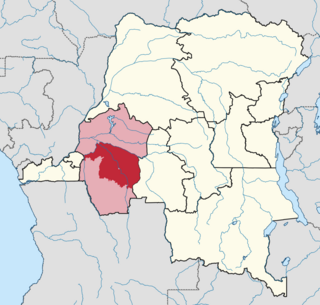
Kwilu District was a district of the Belgian Congo and the Democratic Republic of the Congo. It roughly corresponded to the present province of Kwilu.
The following is a timeline of the history of the city of Kisangani, Democratic Republic of the Congo.
